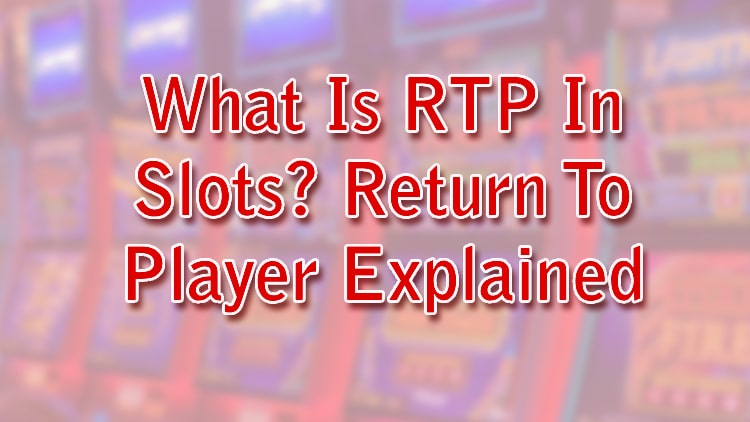
In the captivating universe of online slot games, there's a term that carries significant weight for many gamers: RTP or Return to Player. This term is pivotal in informing many players' choices of which games to engage in. This comprehensive manual seeks to elucidate this term, its implications and how it's calculated.
What Does RTP Mean In Slots?
RTP, an abbreviation for Return to Player, is a commonly employed term in the sphere of online slot games. It's a theoretical figure, denoted as a percentage, that indicates how much a slot game is theoretically expected to pay back to its gamers over an extended duration of play.
For example, if a game has an RTP of 96%, it means that over an extended duration, it's expected to average out as returning £96 for every £100 bet. However, keep in mind that this is a theoretical average derived from an extensive number of simulated spins. Therefore, it doesn't serve as a guarantee of any potential winnings from a slot game - you may win more than this, less than this, or nothing at all.
How Is Return To Player Calculated?
The calculation of RTP is carried out by the game developers. They utilise a vast sample of spins over an extended period and then assess the total amount wagered and the total amount paid out during that period. From this, they calculate the average payout and present it as a percentage.
For example, suppose you're playing an online slot with a 96% RTP. Theoretically, this indicates that the slot averages as paying £96 back to players for every £100 wagered over a long period. However, remember that this is a theoretical average that's based on millions of simulated spins, so in that period, there will be times it paid out nothing and times it paid out more than this. Slots are random, so no results can ever be guaranteed.
Is Higher RTP Better?
The perceived advantage of a higher RTP largely depends on individual player preferences. Some players might be drawn towards games with higher RTP rates due to the impression of better rates of return.
However, games with lower RTP rates, such as jackpot slots, often offer the potential for larger prize wins, thereby attracting many players despite their comparatively lower RTP.
It's also crucial to bear in mind that higher RTP slots do not promise higher winnings. The RTP is a theoretical value, and actual gameplay outcomes may vary significantly due to the inherent randomness of slot games.
What Is Good RTP In Slots?
Determining a 'good' RTP can be somewhat subjective, as views can often vary among players. Generally, the industry-standard RTP for most online slot games hovers around 95%. Therefore, any slot game with an RTP rate above this figure is usually considered to have a high RTP rate.
However, it's essential to remember that playing a slot game with a high RTP does not necessarily guarantee winnings. The outcomes of slot games are inherently random, and the actual results in a player's session may not reflect the RTP rate.
Which Slot Games Have The Highest RTP?
There are numerous online slot games known for their high RTP rates. Some of the notable ones that can also be found at Rose Slots include:
- Blood Suckers: 98% RTP
- Zeus Lightning: 97.73% RTP
- Golden Tour: 97.71% RTP
- Halloween Fortune: 97.06% RTP
- A Pirate's Quest: 96.10% RTP
- Steam Tower: 97% RTP
- Rainbow Riches Pick N Mix: 98% RTP
However, please remember that a high RTP rate does not guarantee winnings. Slot games are predominantly games of chance, and outcomes are determined by a Random Number Generator (RNG), which ensures that all results are random and unpredictable.
Is RTP Affected By Bet Size?
No, the RTP is a theoretical value that doesn't change based on the amount you bet. It's calculated over millions of spins and remains constant, regardless of individual players' bet sizes. So, while the amount you wager can impact your potential winnings, as higher bets can result in higher potential wins (since payouts are proportional to the bet size), it doesn't affect the RTP rate.
Is RTP The Same As Variance?
While both RTP and variance are theoretical indicators of a slot's behaviour, they aren't the same thing. Variance, often referred to as volatility, pertains to the frequency and size of a slot game's payouts. High-variance games are more likely to offer larger but less frequent payouts, while low-variance games provide smaller, more frequent payouts - in theory.
On the other hand, RTP is a theoretical figure representing the percentage of all wagered money a slot averages out as paying back to players over a long duration.
Both values are theoretical and calculated from a large sample over a long time, so results in reality may differ.
Why Is RTP Important In Slots?
Understanding the RTP rate of a slot game can be a valuable tool when trying to decide which online slot games to play. While it's not a strict guarantee of winnings, it does provide an indicator of potential payouts over a long period of play. Therefore, knowing the RTP rate can help players make an informed choice when selecting a slot game to play.
It's crucial to remember that all outcomes in slot games are entirely random. You could win more, you could win less, or you could win nothing at all. Always gamble responsibly by setting limits and playing within your means. If you are no longer enjoying the session, it may be time to take a break or walk away.
Remember, slot games should primarily be viewed as a form of entertainment, not as a way to make money. Always stick to a budget and never chase losses.
*All values (Bet Levels, Maximum Wins, etc.) mentioned in relation to these slot games are subject to change at any time. Game features mentioned may not be available in some jurisdictions.
